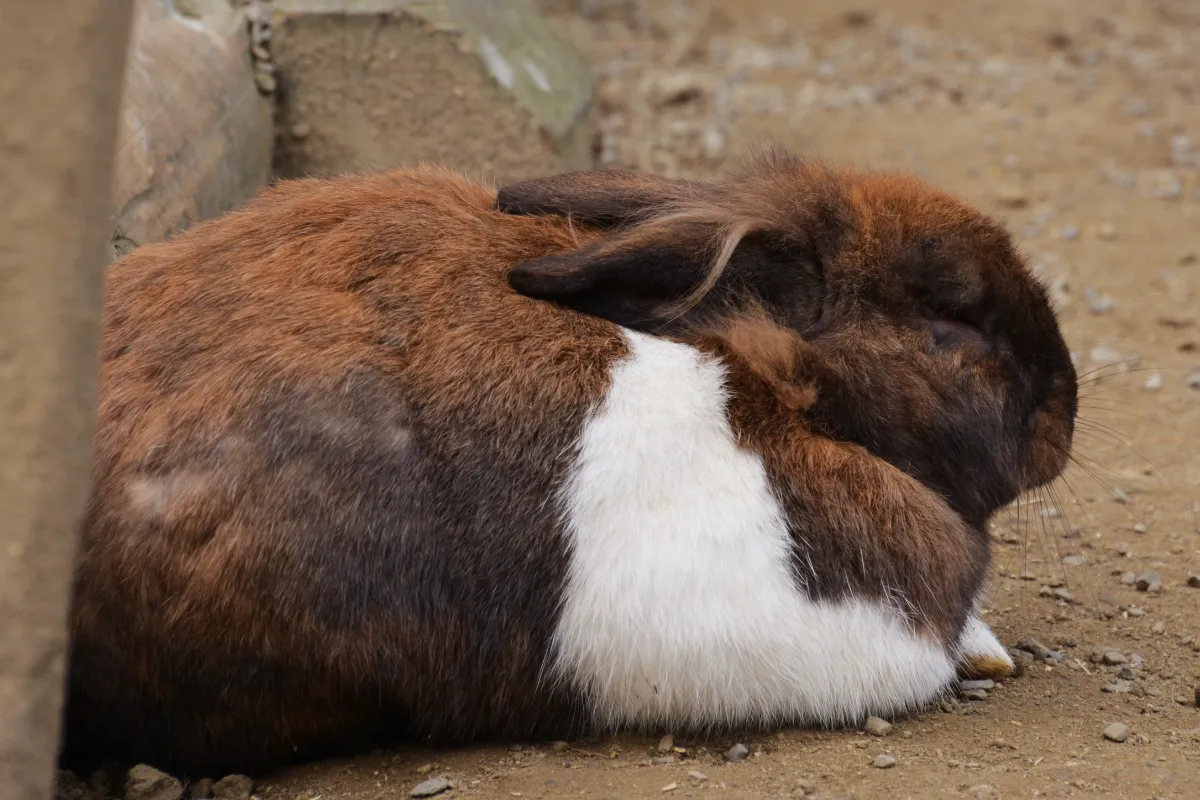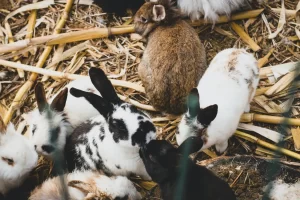Are you wondering how long rabbits are in labor? Well, let us shed some light on this topic for you.
In this article, we will explore the average duration of rabbit labor, the factors that can affect its length, and the signs and stages to look out for.
We will also discuss when to expect a prolonged labor in rabbits and how to monitor and support their progress.
So, sit back, relax, and let us guide you through the world of rabbit labor.
In This Article
- 1 Key Takeaways
- 2 Average Duration of Rabbit Labor
- 3 Factors Affecting the Length of Rabbit Labor
- 4 Signs and Stages of Rabbit Labor
- 5 When to Expect a Prolonged Labor in Rabbits
- 6 Monitoring and Supporting Labor Progress in Rabbits
- 7 Seeking Veterinary Help During Rabbit Labor
- 8 Frequently Asked Questions
- 8.1 Can Rabbits Experience Complications During Labor?
- 8.2 How Can I Tell if My Rabbit Is in Labor?
- 8.3 What Can I Do to Help My Rabbit During Labor?
- 8.4 Are There Any Warning Signs That Labor Is Not Progressing Normally in Rabbits?
- 8.5 At What Point Should I Be Concerned and Seek Veterinary Help During Rabbit Labor?
- 9 Conclusion
Key Takeaways
- The average duration of rabbit labor is usually around 30 minutes to an hour.
- Factors such as litter size, age of the rabbit, and breed can influence the length of labor.
- Prolonged labor can lead to complications for both the mother and the unborn babies.
- Monitoring the signs and stages of labor helps in identifying when prolonged labor may occur.
Average Duration of Rabbit Labor
You should know that the average duration of rabbit labor is usually around 30 minutes to an hour.
However, it’s important to understand that there are several factors that can influence the length of labor in rabbits.
One of the key factors is the size of the litter. Rabbits with larger litters may experience longer labor as they’ve more babies to deliver.
Another factor to consider is the age of the rabbit. Younger rabbits tend to have shorter labors compared to older ones.
Additionally, the breed of the rabbit can also play a role in the duration of labor. Some breeds are known to have shorter labors, while others may take longer.
Factors Affecting the Length of Rabbit Labor
There are several factors that can affect the length of rabbit labor, such as the size of the litter and the age of the rabbit. Understanding these factors is crucial for managing rabbit labor effectively. Here are some tips for managing rabbit labor based on these influencing factors:
| Factors Influencing Rabbit Labor | Tips for Managing Rabbit Labor |
|---|---|
| Size of the litter | Provide a comfortable and safe nesting area for the rabbit. Ensure that the nest box is large enough to accommodate the entire litter. |
| Age of the rabbit | Younger rabbits may have longer labors compared to older ones. Provide a stress-free environment and monitor the rabbit closely during labor. Offer support if needed. |
| Breeding history | Rabbits with a history of difficult labors may require extra attention. Consult with a veterinarian for guidance and be prepared for potential complications. |
| Genetics | Certain rabbit breeds may have predispositions to longer or shorter labors. Understanding the breed’s characteristics can help you anticipate and manage labor more effectively. |
Signs and Stages of Rabbit Labor
When do rabbits typically start showing signs of labor?
Rabbits usually start showing signs of labor around 30 days after mating. It’s important to be aware of these signs so you can provide the necessary care and support for your rabbit during this critical time.
Here are three signs to look out for:
- Nesting behavior: Your rabbit may start digging, pulling fur, and creating a nest in preparation for giving birth.
- Restlessness: As labor approaches, your rabbit may become more restless, pacing, and showing signs of discomfort.
- Contractions: You may notice your rabbit experiencing contractions, which are visible abdominal movements as she prepares to deliver her babies.
It’s crucial to be prepared for any complications that may arise during rabbit labor. Some common complications include dystocia (difficulty giving birth), retained placenta, and postpartum hemorrhage.
To ensure a smooth delivery, it’s essential to have a well-prepared nesting box. Here are some tips:
- Choose the right size: The nesting box should be large enough for the mother rabbit to comfortably lie down and nurse her babies.
- Provide bedding: Use soft materials such as straw or hay to create a cozy and warm environment for the newborns.
- Ensure privacy and security: Place the nesting box in a quiet, secluded area where the mother rabbit can feel safe and undisturbed.
When to Expect a Prolonged Labor in Rabbits
During labor, if your rabbit’s contractions last for more than an hour and she is unable to deliver any babies, you should seek veterinary assistance. Prolonged labor can lead to complications for both the mother and the unborn babies. It is important to understand the signs and stages of labor in rabbits to better manage any potential issues that may arise.
| Complications of Prolonged Labor | Management of Prolonged Labor |
|---|---|
| Exhaustion | Provide a quiet and calm environment for the rabbit. |
| Fetal distress | Administer oxytocin to stimulate contractions and facilitate delivery. |
| Uterine rupture | Perform a cesarean section if necessary. |
It is crucial to closely monitor your rabbit during labor and act promptly if there are any concerns. Seeking veterinary assistance can help ensure a safe and successful delivery for both the mother and her babies. Remember, the well-being of your rabbit is of utmost importance, so do not hesitate to reach out for professional help when needed.
Monitoring and Supporting Labor Progress in Rabbits
As you closely monitor your rabbit’s labor progress, be sure to provide supportive care and seek veterinary assistance if needed. It’s important to stay vigilant during this time to ensure a safe and successful delivery for your rabbit.
Here are some monitoring techniques and birthing assistance tips to help you through the process:
- Observe your rabbit’s behavior: Watch for signs of discomfort or restlessness, as this may indicate that labor is imminent.
- Monitor contractions: Pay attention to the frequency and strength of your rabbit’s contractions. If they become weak or irregular, it may be a sign that intervention is necessary.
- Provide a calm and comfortable environment: Create a quiet space for your rabbit to give birth, with plenty of nesting materials and warm bedding.
Seeking Veterinary Help During Rabbit Labor
If your rabbit experiences complications during labor, don’t hesitate to reach out to a veterinarian for help. In emergency situations like these, it’s crucial to seek veterinary assistance promptly to ensure the well-being of both the mother and her babies.
Rabbits, although generally known for their smooth and quick labor, can sometimes face difficulties during the birthing process. Common complications include dystocia (difficulty giving birth), uterine inertia (lack of contractions), or even the possibility of a stillborn litter. A veterinarian experienced in rabbit care will be able to assess the situation, provide necessary medical interventions, and guide you through the process.
Frequently Asked Questions
Can Rabbits Experience Complications During Labor?
During rabbit labor, complications can occur. It is important to know how to recognize signs of trouble. If you observe any abnormal behavior or distress, seek immediate veterinary assistance for your rabbit.
How Can I Tell if My Rabbit Is in Labor?
You can tell if your rabbit is in labor by observing signs like restlessness, nesting behavior, and pulling out fur. To prepare, provide a quiet, comfortable space with nesting materials and be ready to assist if needed.
What Can I Do to Help My Rabbit During Labor?
During rabbit labor, you can provide comfort measures by offering a quiet and warm birthing environment. Ensure she has plenty of fresh water and food nearby. Stay close to offer support and assistance if needed.
Are There Any Warning Signs That Labor Is Not Progressing Normally in Rabbits?
If you’re wondering about warning signs or normal progression during rabbit labor, it’s important to be aware of any prolonged or difficult contractions, lack of progress, or excessive bleeding. Seek veterinary help if concerned.
At What Point Should I Be Concerned and Seek Veterinary Help During Rabbit Labor?
If you notice any signs of complications during rabbit labor, it’s important to seek veterinary help immediately. Don’t hesitate if you see prolonged labor, lack of progress, or if your rabbit seems distressed.
Conclusion
As a knowledgeable rabbit owner, it’s crucial to understand the average duration of rabbit labor and the factors that can affect its length. By recognizing the signs and stages of labor, you can monitor and support your rabbit throughout the process.
However, if you notice a prolonged labor, it’s essential to seek veterinary help promptly. Remember, being well-informed and prepared will ensure a successful and smooth delivery for your furry friend.





